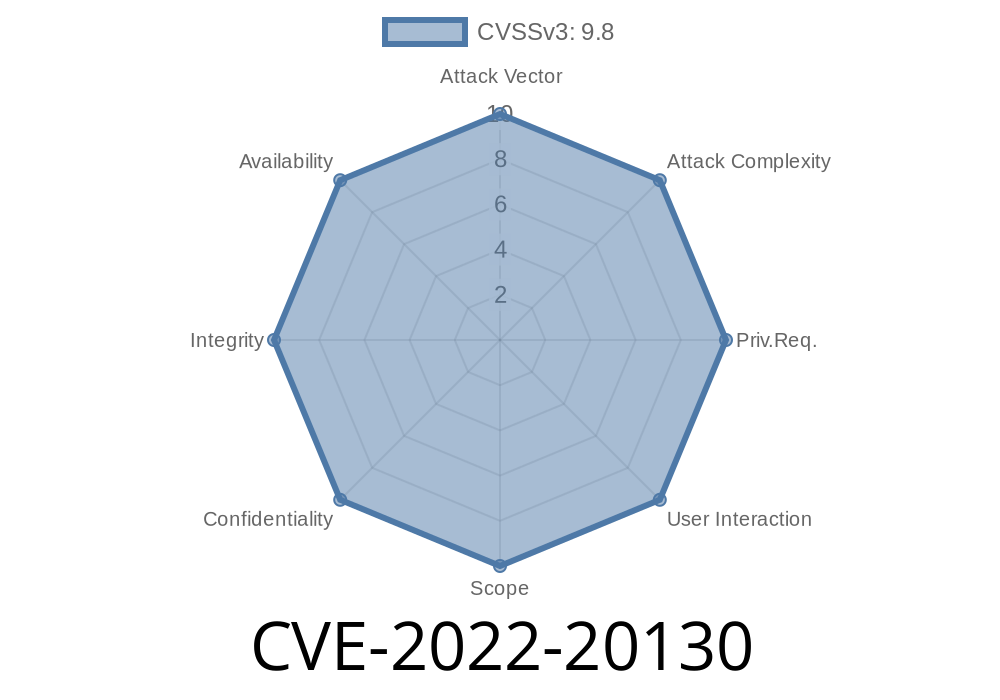Summary:
On June 2022, Google publicly acknowledged CVE-2022-20130, a serious security flaw in Android’s tpdec_lib.cpp. This bug, rooted in an out-of-bounds write (heap overflow) in the transportDec_OutOfBandConfig function, could let remote attackers execute code on affected Android devices, from Android 10 through Android 12L. No user interaction is required, and no special execution privileges are needed for successful exploitation.
This exclusive walkthrough will break down what’s happening behind the scenes, provide reference links, a simplified code snippet highlighting the bug, and explain how an attacker might abuse it.
What is CVE-2022-20130?
CVE-2022-20130 is a vulnerability identified in Android systems, affecting the function transportDec_OutOfBandConfig within the tpdec_lib.cpp source file. This function is linked to the handling of audio transport streams.
The flaw stems from a heap buffer overflow, meaning it’s possible to write data beyond the allocated memory bounds. Doing so can corrupt memory, potentially leading to remote code execution (RCE).
The Vulnerable Code: A Look Inside tpdec_lib.cpp
To understand the problem, here’s a simplified (pseudocode) version of what might occur in the vulnerable function:
// transportDec_OutOfBandConfig in tpdec_lib.cpp
void transportDec_OutOfBandConfig(MyDecoder *decoder, unsigned char* input, int length) {
// Suppose 'decoder->buffer' has been allocated with a fixed size
memcpy(decoder->buffer, input, length); // <--- Possible overflow here
// No check if length > size of decoder->buffer!
}
What’s wrong?
There’s no check to ensure that length doesn’t exceed the size of the allocated decoder->buffer. If an attacker can control the value of length or the contents of input, this can overwrite legitimate data on the heap.
How Could This Be Exploited?
Because the function processes *untrusted input* (for example, from a malformed audio file or stream), a remote attacker can craft data that triggers the overflow. Injecting malicious data enables the attacker to overwrite memory, potentially hijacking program flow. On Android, this could mean running rogue code with the privileges of the vulnerable process. Since no user action is needed, a simple multimedia message, malicious app, or booby-trapped stream could trigger exploitation.
Out-of-bounds write occurs, and attacker’s code is executed inside the media decoder process.
4. Attacker gains control of the device, possibly bypassing sandbox restrictions depending on process privileges.
Proof-of-Concept (PoC) Code Snippet:
Here’s a simulated test exploiting the lack of input validation
// unsafe_test.cpp
unsigned char evil_data[4096]; // much larger than the buffer
// fill evil_data with malicious payload...
// Let's say decoder->buffer is only 1024 bytes
MyDecoder* decoder = create_decoder(1024);
transportDec_OutOfBandConfig(decoder, evil_data, 4096); // Boom! Buffer overflow!
*Disclaimer: This is for illustrative purposes only! Real-world attacks are more complex and may use heap grooming or ROP chains.*
Google patched the problem in AOSP and included fixes in its June 2022 Android Security Bulletin
- Android Security Bulletin—June 2022
- AOSP Commit that fixes the issue
* Always check buffer sizes before copying data
if (length > decoder->buffer_size) {
// reject input or truncate
}
memcpy(decoder->buffer, input, length);
* Use safer functions like memcpy_s or std::copy_n.
* Fuzz your code for boundary conditions.
## Learn More / References
- CVE Record: CVE-2022-20130
- Google Android Security Bulletin (June 2022)
- AOSP Commit Fix
Closing Thoughts
CVE-2022-20130 is a reminder of how a single unchecked buffer copy can expose millions of devices to RCE attacks—no phishing, no user tap required. If your device is running Android 10–12L, ensure it’s updated to the latest security patch. Developers should constantly audit their code for boundary checks, especially when handling media or other user-input data.
*Stay updated, and secure your code—one boundary at a time!*
Timeline
Published on: 06/15/2022 13:15:00 UTC
Last modified on: 06/23/2022 18:02:00 UTC
